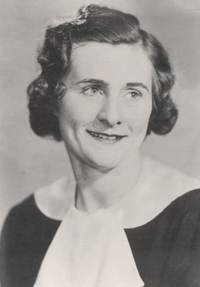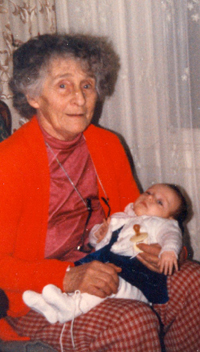A tree of life

Margaret (Spearman) Gibbs, left, was a patient at the Montreal Chest Institute and Royal Victoria Hospital who underwent a successful, groundbreaking lung cancer operation on December 20, 1979. The procedure is no longer used, but it was her ticket to walking out of the hospital cured of her disease. She passed away of natural causes in December 1992, just shy of her 80 birthday.
The mother of eight children, the following story was written by her youngest son, Howard (Buzz) Gibbs, a professor at McGill University. Gibbs holds a Master’s degree in Education (administration and policy) and acts as an advisor and consultant to the McGill School of Continuing Studies. In 1980, while an inpatient in the hospital, she asked her son to write about her greatest companion during her journey with cancer. A writer herself for the local Verdun paper, she always enjoyed the written word…
Life and problems, being what they are, can often present you with situations that just can’t be overcome, solved or banished. Cancer is that kind of problem. I’m not saying it can’t be cured, because it surely can, but it is such a scary disease and such a scary name that even those who are cured of this dread seem to spend the rest of their lives holding their breath at each medical exam. It’s one of those problems that you don’t wrestle to the ground but, you and it, do come to some kind of an agreement, some kind of uneasy co-existence.
Well, my mother is one of those people who developed cancer, and this is a story which is about someone my mother came to know during her long hospital stay.
A lengthy hospital confinement heightens relationships. The reassurance of visits, of conversations, the opportunity to show compassion and yet feel relief when a fellow patient tells a tale more serious that your own. From my visits to my mother’s room, I met several people who, I’m sure, now have a special place in her heart. Among those would surely be the young resident doctor with the boundless sense of caring and the most assuring bedside manner. The volunteers with their book carts and welcome chitchat are a part of this group. The student nurses with their Christmas decorations and their carols and their zest for life brought a touch of a season that is so important and so hard to capture in the crisp cleanness of the hospital milieu.
But all those super people aside, my mother asked me to write about Oscar.
Like Mary and her little lamb, everywhere that mother went, Oscar was sure to follow. Down the hall, into the waiting room, in the elevator, into the craft room, by the bedside all night long, Oscar was a constant companion.
At first, Oscar is an absolute pain. He’s always around, even in the washroom. Like a spoiled child, he needs constant watching. But, unlike a child, he’s not small. He’s well over six foot tall, but thankfully, skinny. He’s just like a big adolescent after that growth spurt when the coordination hasn’t developed yet to handle all that height. Since he’s always around but so tall and awkward, at first, there are plenty of pile-ups from tangled feet or too much bulk in too narrow a space. Also like an adolescent, he’s a follower, not a leader, but he always seems to manage to look down on you. There’s no question that for the first few days, this lanky, straight as a pin fellow can be a hazard to life and limb. He can be a real drip.

Photo of Margaret holding Howard’s newborn daughter Emily in 1984
Oscar has another similarity with the stereotypical tall teenager, and that’s a preoccupation with food. Food, food, and more food is his quest. When those outstretched arms are empty, you can be sure they’ll soon be refilled. Despite all this attention to food, Oscar is far from greedy; in fact, like a generous youngster, he gives it all away to you. Even when you think you’re full or have had enough, Oscar keeps it coming; only the direct intervention of the doctor or the nursing staff can make him stop the constant generosity.
I must stop painting such a negative picture of Oscar, because there is more of him to love than there is to annoy. His awkwardness, his constant presence, his generosity… all his characteristics become a source of comfort, a source of quiet companionship. He never argues, interrupts conversations, never wakes you up to give you pills. Just like the dependable puppy, he waits for you to move so he can tag along.
My mom is a short woman. It was quite a sight to see her and Oscar walking down the hall. Oscar is strong, and on more than one occasion, I’ve seen my mother lean on him for support. Without him, I’m sure she would have fallen a few times. In all the weeks my mother was in hospital, I never once had a visit with her without Oscar being present. I never once resented Oscar’s presence, because Oscar is one of those pieces of hospital equipment that helped save her life, and for that, he’s also my friend. The food he so stubbornly gave my mother was, for her, the food of life. Hour after hour, Oscar dispensed those cancer-fighting drugs and chemicals she needed. Oscar, you see, is that long, tall intravenous IV pole she pushed around for her entire hospital stay. Oscar was her tree of life.
© copyright Howard (Buzz) Gibbs, 11/6/1980